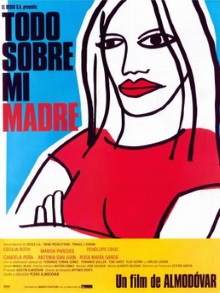
This was one my wife’s picks that she must have read about somewhere and it turned out to be a film with only female characters, including a couple of trans women. It was a surprising coincidence given that we’d only just watched Tokyo Godfathers the day before. Unfortunately it’s also similar to that film in that many points in its plot are connected through a series of implausible events that leave you gasping in disbelief and this time I don’t think that there’s supposed to be any magic involved.
Manuela is an Argentine nurse who is raising her son by herself. On his birthday just after she had promised to tell him the truth about his father whom he had never known, he is killed in a car accident. Distraught, she resigns from her job in Madrid and reconnects with old friends in Barcelona, including the trans woman prostitute Agrado. While looking for a new job, she gets to know Rosa a young social worker who works with prostitutes and Huma Rojo, an aging stage actress. Through it all, references to A Streetcar Named Desire abound, with it both being the play that Huma is currently performing and that Manuela herself had once been involved in, leading her to meet her son’s mysterious father.
As you can probably tell, All About My Mother deals with some pretty heavy topics. The lives of trans women and others’ relationship with them is the most visible and shocking. But it also deals with issues like prostitution and the violence and sexually transmitted diseases that come with the trade, how Rosa lacks the courage to confront her own religiously conservative mother and Huma’s uncomfortable relationship with her much younger co-star and lover Nina, who is addicted to drugs. Arguably there’s too much going on so that we’re often distracted from the main issues. The beginning of the film plays up Manuela’s work at a transplant center and suggests a scenario similar to that in 21 Grams (though this one predates it by a few years) but nothing comes out of that digression. The revelation that Rosa’s father suffers from Alzheimer’s is another weighty moment that is played lightly.
It can’t be denied that the characters are good and all of the actresses play them well. Director Pedro Almodóvar succeeds in making us care for them and there are quite a few scenes that resonate with real emotion. But I just can’t get past the artificial and even absurd manner in which the characters meet each other. For example, Manuela is supposedly a qualified nurse so it should be easy enough for her to find a new job after moving to a new city. Why does she have to pose as a prostitute to ask for help with finding a job from a social worker? As we see later, it’s because the story needs her to befriend Rosa. It’s just as implausible to have Rosa and Manuela suddenly exchange roles, with Manuela becoming her surrogate mother of sorts seemingly within days of their knowing each other. Similarly, Manuela meets Huma simply by wandering backstage on her own and Huma out of the blue decides to ask for help from a random stranger, and intruder even, to look for the wayward Nina. I have a hard time reconciling the heaviness of the issues at hand and the casual way in which plot points are strung together.
Judging by the number of awards this film has won, plenty of people disagree with me and think this is a great film. I’d certainly agree that it’s interesting enough that you should watch it and make up your own mind. For my part I can only say that it has its merits but I don’t like it much at all.
One thought on “All About My Mother (1999)”